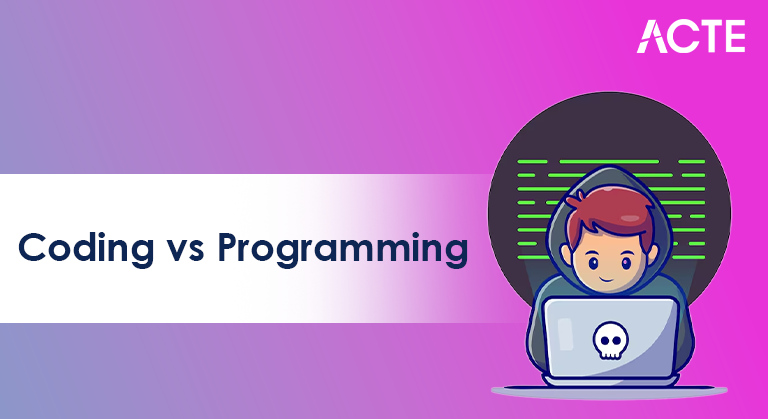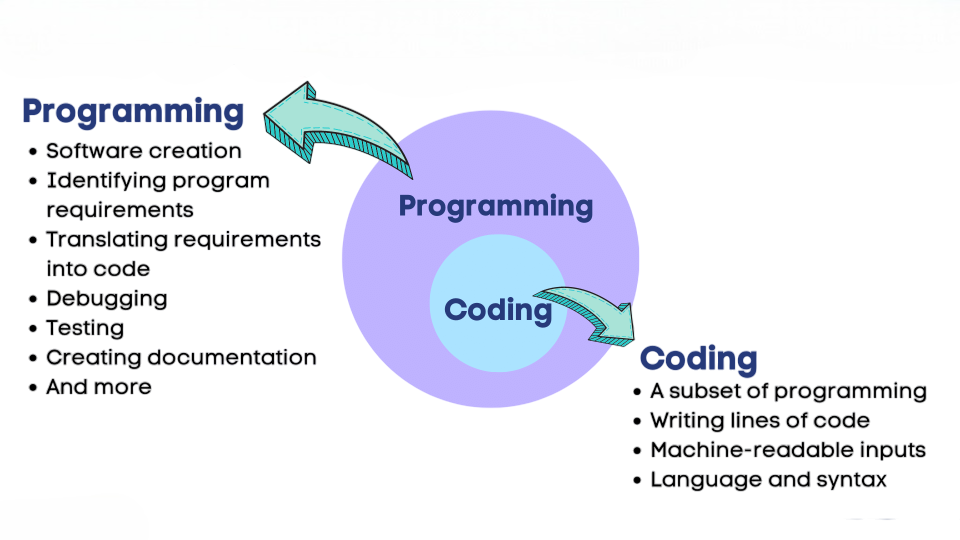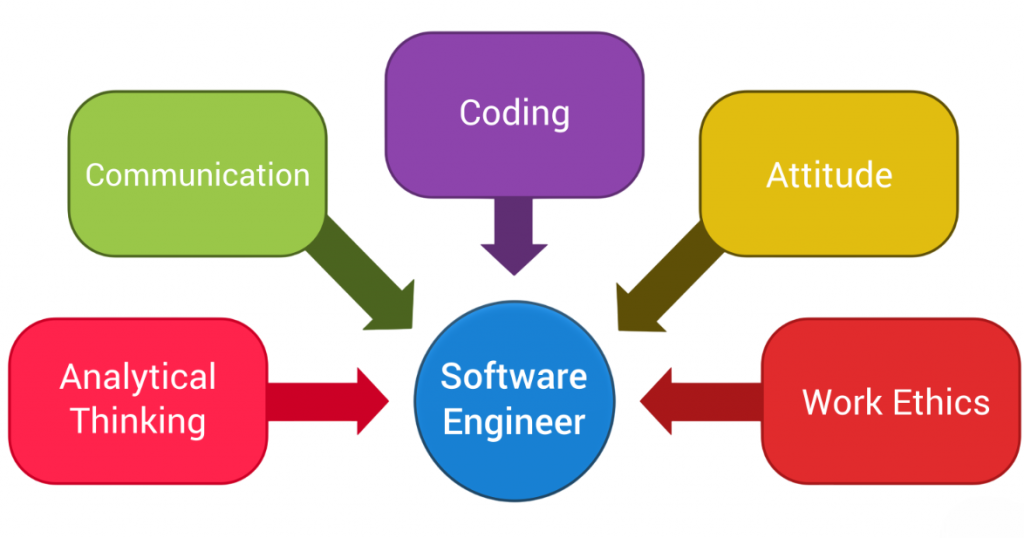
- Introduction
- What is Coding?
- What is Programming?
- Historical Perspective
- Tools and Technologies Used
- Scope of Work
- Required Skills
- Career Roles and Job Titles
- Learning Pathways
- Conclusion
Introduction
Coding vs Programming is a common topic in the realm of software development and computer science, as the terms are often used interchangeably. However, while they are closely related and sometimes overlap, they represent distinct stages of software development and require different sets of skills, tools, and understanding.

Interested in Obtaining Your Python Certificate? View The Python Developer Course Offered By ACTE Right Now!
What is Coding?
Coding is the process of translating and writing lines of code in a language that computers can understand. It’s the act of converting human ideas into machine-readable instructions using programming languages like Python, Java, C++, or JavaScript. Coders often work with specifications provided by developers or software engineers, writing code that performs specific tasks. To ensure smooth data exchange between systems and formats, exploring Python Serialization reveals how converting objects into byte streams enables storage, transmission, and reconstruction of complex data structures with ease. In essence, coding is part of programming; it’s the implementation phase. A coder doesn’t necessarily need to understand the broader logic or architecture of a system; their role is more about writing efficient, clean, and functional code blocks that solve individual problems or features.
What is Programming?
- The role of a software engineer is increasingly seen as one of the most desired positions in today’s job market. Companies want to attract top talent, leading to competitive salaries for skilled professionals. Software engineers can find opportunities in various industries, making this a flexible career choice. However, success in this field requires dedication, ongoing education, and a readiness to learn new technologies.
- As the tech landscape changes, the demand for skilled engineers also grows, ensuring that job prospects will stay strong in the future. A clear Software Engineer Job Description is important for job seekers because it outlines the key skills and responsibilities needed for success. By understanding these expectations, aspiring software engineers can prepare themselves with the tools they need to excel and stand out among other candidates in this dynamic and competitive field.
- Historically, the term “programming” covered the whole process of creating software. In the early days of computing, it took highly skilled workers who handled everything from memory allocation to complex binary machine instructions. As the field changed, software development became more modular. This led to the role of the coder, which focused mainly on writing and implementing code.
- Today, coding serves as an accessible entry point into the tech world. Coding bootcamps and online courses have emerged to make it easier for many people to get involved in software development without needing deep theoretical knowledge. Meanwhile, programming still relates to broader areas like system design, structure, and software engineering. This difference shows how the technology landscape has evolved, welcoming a wide range of contributors while still upholding high standards in programming practices.
- To succeed as a coder, you must be skilled in a specific programming language and have a good grasp of basic programming concepts like loops and conditionals. Being able to debug and test simple code segments is important. You should also pay attention to detail and follow syntax rules.
- Programmers need to go beyond the basics, they should understand fundamentals of computer science such as algorithms and data structures. Problem-solving skills are key, along with knowledge of object-oriented programming, system design, and databases.
- To prepare for unpredictable system loads and performance challenges, exploring What is Spike Testing reveals how sudden traffic surges are simulated to evaluate system stability, scalability, and recovery under extreme conditions.
- Knowing how to work with APIs is also important. Besides technical skills, communication and teamwork are essential, especially in group settings. A well-rounded programmer writes clean and maintainable code and effectively shares ideas and solutions with others.
- In the software industry, entry-level roles like Junior Developer, Frontend Coder, Script Writer, and Software Intern are the first steps for future programmers. In these positions, people usually write code under the guidance of more experienced colleagues, which helps them learn the basics of software development.
- As they gain experience, these coders can move on to more advanced roles with greater responsibility. To understand how services communicate in distributed systems, exploring What is WSDL in Web Services reveals how WSDL defines the structure of web service interactions enabling seamless integration, automation, and interoperability across platforms.
- Programmers may advance to titles such as Software Developer, Backend Developer, Full Stack Developer, Application Architect, or Embedded Systems Programmer. In these jobs, they make important decisions about the application’s design, performance, and reliability, significantly impacting project success. By understanding the differences in these roles, newcomers can better navigate their career paths in the tech industry and identify the skills they need to move forward.
Gain Your Master’s Certification in Python Developer by Enrolling in Our Python Master Program Training Course Now!
Historical Perspective
Tools and Technologies Used
Coders primarily use tools like text editors (VS Code, Sublime Text), basic integrated development environments (IDEs), syntax highlighters, and basic version control systems like Git. These tools help them focus on the act of writing and editing code efficiently. Programmers, in contrast, use a wider array of tools, including advanced IDEs (IntelliJ IDEA, Eclipse), debuggers, profilers, build systems (Maven, Gradle), design tools, testing frameworks, and CI/CD pipelines. To gain hands-on experience with these technologies and elevate your development workflow, exploring Python Training reveals how mastering Python equips you to integrate seamlessly with modern toolchains, automate tasks, and build scalable applications across domains. These tools support the full lifecycle of software development from architecture to deployment and maintenance.
Are You Preparing for Python Jobs? Check Out ACTE’s Python Interview Questions and Answers to Boost Your Preparation!
Scope of Work
The scope of work for coders is typically limited to translating logic into code, writing functions and modules, and implementing features based on detailed specifications provided by programmers or project leads. Their focus is mainly on accuracy, syntax, and execution. Programmers, however, are responsible for defining the problem, designing the solution, planning the overall software structure, managing algorithms, ensuring performance, and integrating APIs and databases. To support these responsibilities with a robust development platform, exploring What is .Net FrameWork reveals how Microsoft’s framework streamlines application development through built-in libraries, language interoperability, and seamless integration with enterprise tools. They are also involved in decisions related to scalability, security, and system architecture.
Required Skills

Career Roles and Job Titles
Learning Pathways
To become a coder, individuals usually begin with basic programming tutorials and bootcamps that focus on practical skills. Courses on Python, JavaScript, or web development provide an accessible entry point. To become a programmer, a more in-depth learning journey is required. This often includes a computer science degree or equivalent self-taught knowledge, studying advanced topics such as algorithms, data structures, databases, and software architecture. To expand into hardware-integrated systems and real-time data acquisition, exploring Virtual Instrumentation using Labview reveals how graphical programming and modular design enable engineers to build scalable, sensor-driven applications across industries. Participating in real-world projects and open-source contributions helps build experience and confidence.
Conclusion
Coding vs Programming may seem similar, but they differ significantly in scope, skill requirements, tools used, and overall impact on software development. Coding is the foundational step in writing the actual code that runs a program, while programming is a broader, more strategic process that involves everything from system architecture to debugging and deployment. A solid grasp of Coding vs Programming is crucial for anyone entering the tech industry. Beginners might start as coders, but with experience, learning, and exposure, they can grow into seasoned programmers. To accelerate that growth with practical skills and real-world projects, exploring Python Training reveals how mastering syntax, problem-solving, and application development in Python can transform learners into confident, job-ready professionals. Both roles are essential in the technology ecosystem, and recognizing their contributions can help individuals choose the right learning path, set career goals, and appreciate the layers of complexity involved in building modern software systems. Whether you’re just starting your journey or already in the field, understanding Coding vs Programming empowers you to communicate better, learn smarter, and work more effectively within a development team.





